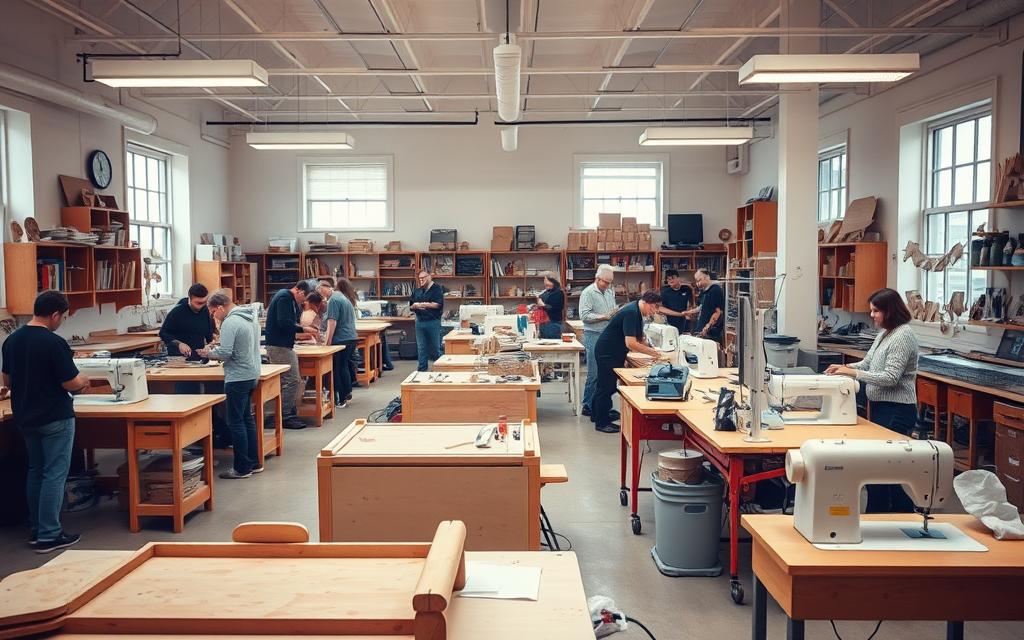Advertisement
Did you know over 1,400 community DIY spaces have popped up in the U.S.? These places, called maker spaces, are full of tools and experts. They help people make their ideas real.
Imagine a place where you can learn to sew, work with wood, or fix electronics for free. Maker spaces offer free classes and workshops. This makes it easy to learn new things and be creative.
Whether you’re experienced or just starting, maker spaces are great for you. They’re perfect for exploring your interests and meeting others who share them. In this guide, we’ll dive into the maker space world. We’ll also show you the best places to start.
What Are Maker Spaces and Why Are They Important?
Maker spaces are becoming key places for creativity, teamwork, and learning. They are community-driven spots where people can innovate, create, and solve problems together.

Definition of Maker Spaces
Maker spaces, also known as community workshops or collaborative studios, are places where people work on projects together. They share knowledge and learn from each other. These spaces have many tools, from sewing machines to digital fabrication machines.
They are open to everyone, no matter your skill level or background. Maker spaces offer the tools and support you need to make your ideas real.
Community Engagement and Collaboration
Maker spaces are great at bringing people together. They encourage community engagement and collaboration. This helps build strong, connected communities.
- Members can take part in workshops and classes to learn new things.
- Working together on projects sparks innovation and creativity. Everyone brings their own ideas and skills.
- Maker spaces also host events and exhibitions. This lets members show off their work and meet others.
Maker spaces are important for a culture of sharing, creativity, and support. They are places where people can grow, learn, and help their communities.
Types of Classes Offered in Maker Spaces
Maker spaces have changed how we learn new things. They offer many classes. These creative workspaces help people work together and be creative.
In these shared workshops, you can try new things and learn new skills. Classes are for all levels. So, whether you’re just starting or very skilled, you’ll find something interesting.
Sewing Classes for All Skill Levels
Sewing classes in maker spaces are for everyone. You can start from scratch or improve your skills. These classes have something for everyone.
- Beginner classes teach the basics of sewing, like using a machine and simple stitches.
- Intermediate classes are for more complex projects, like making clothes or embroidery.
- Advanced classes cover special techniques, like quilting or tailoring.
Woodworking Workshops: Build Your Own Projects
Woodworking workshops let you work on your own projects. You’ll learn from experienced teachers. Classes cover everything from basic tools to advanced techniques.
- Basic classes teach you the basics of woodworking and safety.
- Intermediate workshops help you build more complex items, like furniture.
- Advanced classes focus on detailed designs and finishes.
Repair Clinics: Fix, Don’t Replace
Repair clinics teach you to fix things instead of throwing them away. They cover many repair skills, from electronics to household items.
Maker spaces offer many classes. They help you learn new skills and build a community. Whether you like sewing, woodworking, or fixing things, there’s a class for you.
Benefits of Joining a Maker Space
Joining a maker space can change your life. It opens up a world of creativity and innovation. These places are where people come together to create, learn, and innovate.
Access to Tools and Equipment
One big plus of maker spaces is the tools and equipment they offer. You won’t find 3D printers, laser cutters, woodworking machines, and sewing tools easily. Maker spaces have the latest tech labs for everyone to use.
Some of the equipment you might find includes:
- 3D printing and scanning technology
- Woodworking and metalworking tools
- Sewing and textile manufacturing equipment
- Electronics and circuitry tools
Learning New Skills and Techniques
Maker spaces offer classes and workshops to learn new skills. Whether you’re starting with sewing or you’re an expert in woodworking, there’s something for you.
Some of the skills you can learn include:
- Sewing and textile manipulation
- Woodworking and furniture making
- Basic electronics and circuitry
- 3D modeling and printing
Networking Opportunities
Maker spaces also offer great chances to meet new people. You can connect with others who share your interests, share ideas, and work on projects together. Maker spaces often host events and meetups, making it easy to get involved and meet new people.
The community aspect of maker spaces is a key part of their appeal. By joining a maker space, you become part of a vibrant community that loves creativity and innovation.
How to Find a Maker Space Near You
Finding a local maker space is easier than you think. Use online directories, local resources, and social media. Whether you’re into community workshops or DIY projects, there are many ways to find the right place for your creativity.
Online Directories and Resources
Online directories are a great place to start. Websites that list maker spaces and workshops help you find what you need. They let you search by location and activity type.
- Maker Space Directories: Look up online databases that list maker spaces nationwide.
- Community Boards: Meetup.com often has groups for maker spaces and DIY projects.
Local Community Boards and Libraries
Local community boards and libraries are full of maker space info. They post flyers and have bulletin boards for local groups.
Check your local library or community center for maker space, woodworking, or repair clinic info.
Social Media Groups and Forums
Social media is also a good way to find maker spaces. Join local groups or forums on Facebook or Reddit to meet like-minded people.
- Facebook Groups: Look for local maker space or DIY groups.
- Reddit Forums: DIY or maker space subreddits are great resources.
| Resource | Description | Benefits |
|---|---|---|
| Online Directories | Websites listing maker spaces | Easy search, comprehensive listings |
| Local Community Boards | Physical boards at local centers | Local focus, up-to-date information |
| Social Media Groups | Online communities on platforms like Facebook and Reddit | Interactive, community-driven |
The Role of Maker Spaces in Skill Development
Maker spaces are lively places where creativity and innovation grow. They are key in developing skills. These collaborative studios and creative workspaces create a space for trying new things, learning, and growing.
Maker spaces help people become more creative and innovative. They offer many tools and technologies. This lets people try different ways of creating, expanding their creative skills.
Enhancing Creativity and Innovation
Maker spaces have the latest tools and software. This lets people work on projects that spark their creativity. For example, a sewing class might teach you to make a garment from start to finish. A woodworking workshop could teach you to make furniture.
- Access to diverse tools and materials
- Opportunities for experimentation and trial
- Collaboration with others to share ideas and expertise
This mix creates a space that encourages creative thinking and innovation. As people work on projects, they learn to solve problems and see things from new angles.
Building Confidence Through Hands-On Experience
Hands-on experience is key in maker spaces. Working on real projects gives people practical knowledge and boosts their confidence. The supportive community in maker spaces helps too, where people can share and learn from each other.
Hands-on experience helps build confidence in several ways:
- Completing projects and achieving tangible results
- Receiving feedback and guidance from peers and instructors
- Developing a sense of accomplishment and pride in one’s work
In summary, maker spaces are crucial for skill development. They boost creativity and innovation and build confidence through hands-on experience. As creative workspaces, they offer a special place for personal and professional growth.
What to Expect in a Sewing Class
When you join a sewing class, you’ll find a supportive community. You’ll also have access to many sewing machines and tools. Maker spaces are perfect for creativity and teamwork, making them great places to learn.
The classes are set up for all skill levels. Whether you’re new to sewing or want to get better, there’s something for you. You can make clothes, home decor, or accessories, and it’s all fun.
Materials and Equipment Provided
Most maker spaces offer lots of materials and tools for sewing classes. You’ll find:
- Industrial sewing machines for tough projects
- Serger machines for top-notch finishes
- Many fabrics, threads, and notions for your projects
- Cutting tables and rotary cutters for accuracy
Common Techniques and Projects
Sewing classes in maker spaces teach many techniques and projects. Some common ones include:
| Technique/Project | Description | Skill Level |
|---|---|---|
| Basic Garment Construction | Learn to make simple garments like skirts and tops. | Beginner |
| Quilting | Create beautiful quilts using various patterns and techniques. | Intermediate |
| Home Decor Sewing | Make items like pillowcases, tote bags, and table runners. | All Levels |
By the end of the class, you’ll have made several projects. You’ll gain experience and confidence in sewing.
Overall, sewing classes in maker spaces are a great way to learn. You’ll get to meet others who share your interests.
Woodworking Classes: From Beginner to Advanced
Maker spaces are now places where people can learn and make things. They offer classes for all skill levels, from newbies to experts in woodworking.
First, it’s important to know about safety precautions. Woodworking uses strong tools, so following safety rules is key. Classes teach how to use these tools safely.
Safety Precautions and Tool Usage
Keeping safe while woodworking is very important. Classes start with lessons on tool safety. This includes wearing the right protective gear like safety glasses and ear protection.
- Proper handling techniques for various tools
- Understanding the importance of maintaining a clean and organized workspace
- Familiarity with emergency procedures
As you get better, you learn about different tools and machines. This includes hand tools, power tools, and big machines like table saws.
“The art of woodworking is not just about creating something with your hands; it’s about understanding the process, the materials, and the tools.” – Anonymous Woodworker
Types of Projects You Can Undertake
Woodworking classes let you try many projects. Beginners might start with easy things like birdhouses or small cutting boards. More experienced people can tackle bigger projects like furniture or cabinets.
| Project Type | Skill Level | Description |
|---|---|---|
| Simple Cutting Board | Beginner | A basic project that introduces participants to measuring, cutting, and sanding wood. |
| Furniture Making | Advanced | Involves creating complex pieces of furniture, requiring precision and advanced woodworking techniques. |
| Wood Carving | Intermediate | Focuses on carving designs into wood, requiring patience and some experience with hand tools. |
Maker spaces are like tech labs where creativity meets tech. You can try out new techniques, from old-school woodworking to modern CNC machining.
Woodworking classes in maker spaces help build a community of makers. They’re great for starting a hobby or improving your skills. These classes offer a place to learn and grow in a supportive environment.
The Importance of Repair Workshops
Repair workshops in maker spaces are changing how we deal with waste and sustainability. They give people a chance to learn how to fix things. This helps create a more sustainable culture.
Reducing waste is a big plus of repair workshops. When people know how to fix things, they don’t throw them away as much. This means less waste ends up in landfills.
Sustainability and Reducing Waste
Consumerism has a big environmental impact, with tons of waste every year. Repair workshops teach people to make their stuff last longer. This is a practical way to fight waste.
Repair workshops help the environment in several ways:
- They teach basic repair skills for everyday items.
- They encourage using and reusing materials.
- They foster a mindset of maintenance and repair.
| Repair Technique | Common Applications | Environmental Benefit |
|---|---|---|
| Basic electronics repair | Fixing household appliances, toys, and gadgets | Reduces electronic waste |
| Textile repair | Mending clothes, upholstery, and fabric items | Extends the life of textile products |
| Furniture repair | Restoring and refurbishing furniture | Reduces wood and material waste |
Basic Repair Techniques You’ll Learn
In repair workshops, you’ll learn many basic skills. These include:
- How to find and fix common problems with electronics and appliances.
- Basic sewing and patching for textiles.
- Ways to restore and refurbish furniture and other items.
Hands-on experience is key in these workshops. It lets you practice what you’ve learned with the help of experts.
How to Get Involved in Your Local Maker Space
Getting involved in your local maker space is rewarding. You can learn new skills and meet others who share your interests. Maker spaces welcome everyone, making it a great place to share ideas and work on projects.
To begin, find a maker space near you. Then, learn about the membership requirements and fees. Fees can differ based on the space’s size, resources, and who it serves.
Membership Requirements and Fees
Most maker spaces have a membership model. This lets you use their facilities and join in activities. You might pay an initial fee and then monthly or yearly dues.
Some spaces offer different membership levels. A basic membership might give you access during certain hours. A premium membership could include more perks like equipment access, class discounts, or event invitations.
Volunteering and Leading Workshops
Volunteering is a great way to dive into your local maker space. Many spaces need volunteers for daily tasks, maintenance, and events. Volunteering helps the community and lets you see how the space works.
If you’re skilled in something, consider leading a workshop. This lets you share your knowledge and help others learn. When leading a workshop, you’ll plan the event, promote it, and run it on the day.
Leading workshops is fulfilling. You get to see people learn and grow as they work on projects. Whether it’s a sewing class or a woodworking workshop, you’re helping the maker space thrive.
Success Stories from Maker Space Participants
Maker spaces are now lively places for creativity and teamwork. They have become hotspots for innovation and collaboration. Many success stories have emerged from these shared workshops, showing the power of community projects.
Innovative Projects Born in Maker Spaces
People in maker spaces have worked on many exciting projects. They’ve made sustainable furniture and custom prosthetics. For example, a local artist made a big installation that mixed woodworking and electronics. This shows how versatile these spaces are.
Voices from the Community
People who use maker spaces share their positive experiences. One person talked about the supportive atmosphere, saying it helped them try new things. Another person said the maker space helped them start a business. They credited it for the skills and connections they made.



